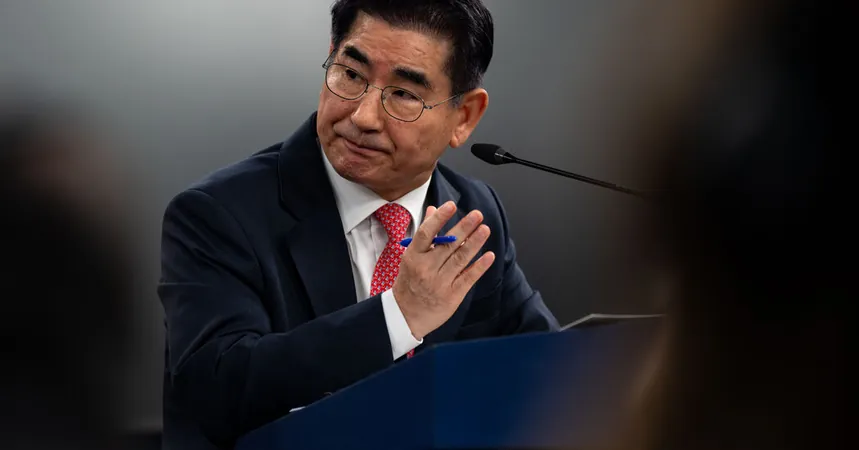
South Korea's Defense Minister Resigns Amid Martial Law Crisis: What’s Next for President Yoon?
2024-12-05
Author: Wei
South Korea's Political Turmoil
In a dramatic turn of events, South Korea’s Defense Minister Kim Yong-hyun has stepped down following President Yoon Suk Yeol’s brief and controversial declaration of martial law. This marks the first cabinet resignation since President Yoon took office, highlighting the deepening political turmoil in the nation.
Resignation and Succession
Kim Yong-hyun submitted his resignation on Wednesday, citing personal responsibility for the crisis precipitated by the martial law decree, which took the country by storm on Tuesday night. Despite nationwide uproar surrounding the declaration, the defense minister did not address claims from opposition lawmakers that he had suggested the idea to President Yoon.
Government Restructuring
Following this upheaval, President Yoon appointed Choi Byung Hyuk, a retired army general currently serving as South Korea’s ambassador to Saudi Arabia, as Kim’s successor. This change comes amid mounting pressure on the government after the National Assembly voted unanimously against the martial law declaration, which was swiftly rescinded by Yoon early Wednesday morning.
Impeachment Motion
The opposition has escalated the political crisis by introducing a motion to impeach President Yoon, with a vote potentially taking place as early as Friday. Should two-thirds of the 300 lawmakers in the National Assembly choose to support the motion, Yoon will face suspension until the Constitutional Court delivers a ruling on his fate. While all 192 opposition lawmakers back the impeachment effort, they require at least eight votes from Yoon's People Power Party to proceed.
Party Dynamics
In a surprising move, Han Dong-hoon, the head of the People Power Party, has stated his intention to persuade party members to vote against the impeachment in a bid to prevent what he describes as "national confusion." Contrastingly, he openly condemned the martial law decree as "unconstitutional" and urged President Yoon to relinquish his party membership. Han also called for the removal of military officials who facilitated the enforcement of martial law, warning that involvement in such actions will result in immediate consequences.
Military Operations Under Scrutiny
The situation escalated when General Park An-su, the army chief of staff, oversaw the military operations that occurred during the martial law period. Troops were deployed inside the National Assembly in a move that opposition lawmakers denounced as "illegal" and "unconstitutional." In response, staff members resorted to barricading access points and utilizing fire extinguishers to prevent troops from entering the voting area.
Future Implications
As political tensions soar and public dissent grows, the stability of President Yoon's administration hangs in the balance. With the looming impeachment vote, the implications of this crisis could reshape South Korea’s political landscape for years to come. How will the president navigate the storm ahead, and what does this mean for the nation’s future? Stay tuned as we continue to cover this evolving story!


 Brasil (PT)
Brasil (PT)
 Canada (EN)
Canada (EN)
 Chile (ES)
Chile (ES)
 España (ES)
España (ES)
 France (FR)
France (FR)
 Hong Kong (EN)
Hong Kong (EN)
 Italia (IT)
Italia (IT)
 日本 (JA)
日本 (JA)
 Magyarország (HU)
Magyarország (HU)
 Norge (NO)
Norge (NO)
 Polska (PL)
Polska (PL)
 Schweiz (DE)
Schweiz (DE)
 Singapore (EN)
Singapore (EN)
 Sverige (SV)
Sverige (SV)
 Suomi (FI)
Suomi (FI)
 Türkiye (TR)
Türkiye (TR)